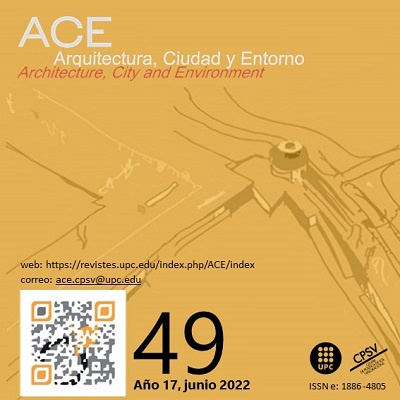Avaluació dels instruments de regulació de l’habitatge d’interès social a Mèxic amb enfocament de qualitat ambiental. Cas d’estudi: Durango
DOI:
https://doi.org/10.5821/ace.17.49.10567Paraules clau:
Sostenibilitat, lineaments normatius, planejament urbà, habitatge d’interès socialResum
L’objectiu d’aquest treball va ser elaborar una eina d’avaluació dels instruments que regulen el desenvolupament de l’habitatge d’interès social (VIS) a Mèxic per identificar els lineaments mínims que facilitin la qualitat ambiental dels seus habitants. L'estratègia metodològica va ser l’avaluació d'un cas d'estudi —municipi de Durango— identificant les similituds i les deferències d’instruments de regulació vers un sistema de certificació internacional —CASBEE-UD—. La recerca es va fonamentar en dos elements que emmarquen la problemàtica: 1) l’escassa articulació entre elements normatius i de planejament als tres nivells de govern a Mèxic i, 2) l’absència de criteris de sostenibilitat en les regulacions actuals. Es conclou que els instruments de regulació de l’habitatge d’interès social, en un nivell operatiu, són generalistes i no garanteixen la qualitat ambiental en el context urbà. S’espera que els lineaments específics proposats en aquest treball —on es van articular paràmetres de construcció, planejament urbà i criteris de sostenibilitat— contribueixin amb el millorament del marc que regula el desenvolupament i construcció de la VIS a Mèxic.
Descàrregues
Publicades
Número
Secció
Llicència
| CRITERIS DE PROTECCIÓ INTEL·LECTUAL |
En aquest moment es compta amb la protecció de la Oficina Espanyola de Patents i Marques, mentre que la protecció global s'està tramitant davant la Organització Mundial de la Propietat Intel·lectual (OMPI/WIPO). Així mateix, la Oficina del Número de Sèrie Estàndar Internacional (ISSN) ha otorgat els següents números: 1886-4805 (versió electrònica) i 1887-7052 (versió en paper). |
| COPYRIGHT |
El contingut dels articles i els comentaris en ells expresats són responsabilitat exclusiva dels seus actors, i no reflexen necessariament la opinió del Comité Editor de la revista. Els treballs publicats per ACE queden sotmesos a la llicència CC BY-NC-ND 3.0 ES http://creativecommons.org/licenses/by-nc-nd/3.0/es/ La qual cosa vol dir que les persones autores només tenen i retenen els drets d'autor dintre de les limitacions imposades per la anterior llicència |


































